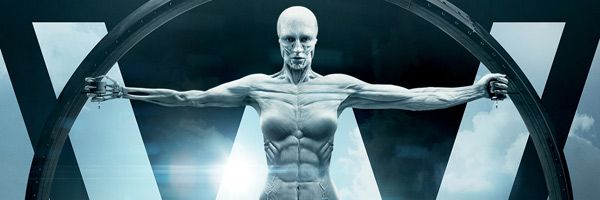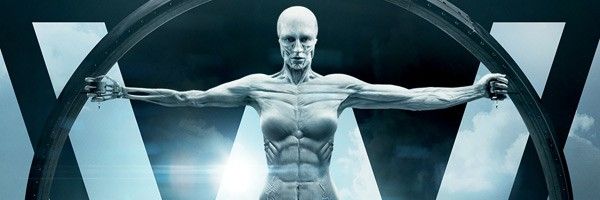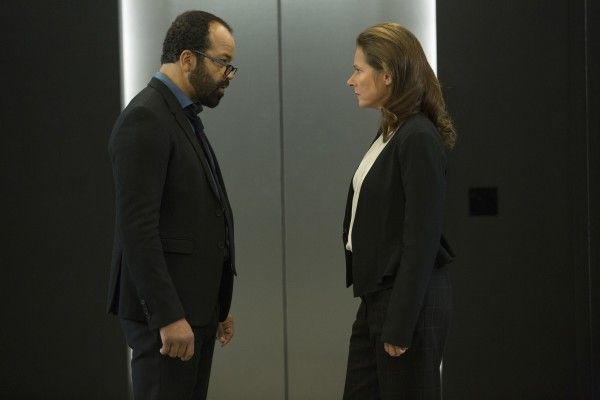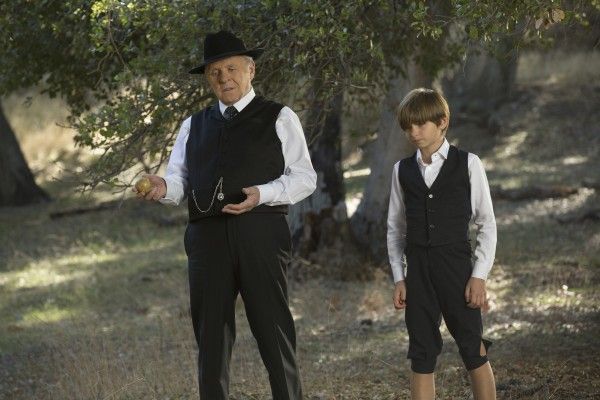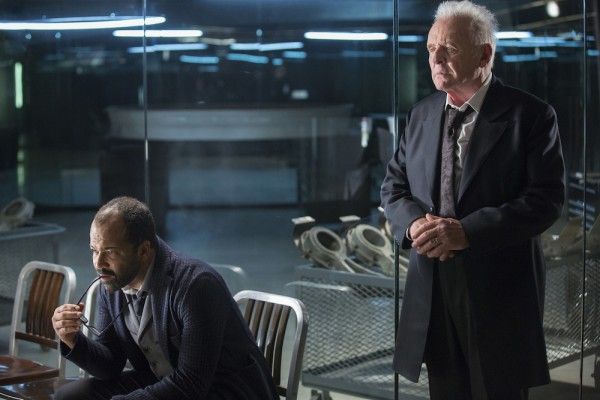 Image via HBO[/caption]
Westworld's writers know what kind of game they're playing and, if you were looking, the signs have always been there. The way Ford has always spoken to and about Bernard in a condescending, know it all fashion. The pillow-talk jokes with Teresa about whether or not Benard is "practicing" his humanity with her. The fact that his son died of an illness in a time when we know all illness has been cured. For more details, you can check out my Westworld theories explainer or Kayti's Bernard break down, but Westworld has invited this speculation from the beginning, and that's exactly why the 'Trompe L'oeil' twist works even if you saw it coming. The truth about Bernard has been carefully and intentionally worked into the narrative in a way that feels like a payoff rather than a deception.
Image via HBO[/caption]
Westworld's writers know what kind of game they're playing and, if you were looking, the signs have always been there. The way Ford has always spoken to and about Bernard in a condescending, know it all fashion. The pillow-talk jokes with Teresa about whether or not Benard is "practicing" his humanity with her. The fact that his son died of an illness in a time when we know all illness has been cured. For more details, you can check out my Westworld theories explainer or Kayti's Bernard break down, but Westworld has invited this speculation from the beginning, and that's exactly why the 'Trompe L'oeil' twist works even if you saw it coming. The truth about Bernard has been carefully and intentionally worked into the narrative in a way that feels like a payoff rather than a deception.
But Westworld isn't in its usual state, so neither is his loop, and the tumultuous relationship between DELOS and Dr. Ford leads to the revelation so many of us have been waiting for after Bernard loses his job and brings Teresa to the home of Ford's surrogate family. As they're arriving he tells her, "The longer I work here, the more I think I understand the hosts. It's the human beings who confuse me." No, not very subtle at all.
Once there, she discovers Bernard's tragic truth, that he's nothing but one of Ford's creations, and the audience discovers it visually in what is becoming a classic Westworld camera move. Teresa points to a door that Bernard cannot see, the camera swings 360 behind him to reveal it was there the whole time. We just couldn't see it because we were seeing from his perspective. (We've seen this move a lot with our unreliable host narrators, Dolores in particular, and I imagine theorists would do well to go look back on those moments for context cues.) It's a nice touch and a demonstration of how expertly designed this show has been -- this is exactly why Bernard couldn't see Ford until he was right next to him in 'The Adversary'. Every bit of this series has been meticulously thought out. Westworld respects its audience. If you are paying attention, it will reward you.
For example, look at Teresa's body language as Ford is closing in on her. She's doing just what Bernard told her, keeping her hands on her hips in a power pose so she doesn't show her weakness. Tragically, she just can't see that she's the most vulnerable she's ever been. Credit must also be paid to Sidse Babett Knudsen and Jeffrey Wright for making this moment work. They are extraordinary, especially Knudsen, who runs an emotional marathon as she slowly grasps how dire of a situation she's truly in.
And just like that, the truth of Bernard's sad existence is revealed and the rest of the sequence plays out with a stomach-sinking horror as Teresa discovers that truth for herself, finding Bernard's design plans, and with his casual dismissal and the ultimate confirmation: "It doesn't look like anything to me." That horror only sinks further when Ford appears, having instructed Bernard to bring Teresa after a crass power play from the board. And in a single sequence Ford reveals himself for the true snake he is, commanding Bernard to murder the one real person he has grown intimate with. Ford is a "fucking monster" indeed and that revelation is part of why this twist works so well. In the midst of Westworld's orchestrated mysteries, it was time for some truths.
The truth about Bernard is only a part of the reveal, a slight shift in perspective that frames a ballistic advance in the narrative. We also now know for sure another truth we've long suspected, Ford is a calculating player of Westworld's game -- and he's the very best, shaping the future of both the world he's created and the world he lives in. He plays god in the "real world" as casually as he does in the park. He's also a cold-blooded killer, which was hinted at in 'The Adversary when the child/host Ford killed the family dog. Teresa's murder will likely have implications of its own, though Ford seems rather confident he can literally get away with murder, and that assurance in itself raises all kinds of questions.
First of all, how will he conceal her murder? Or is it possible he's so powerful he doesn't have to? Maybe I'm just not keen to see Knudsen go, but has he already started creating a robot surrogate for her? Wouldn't it be a chilling reveal to find that the host he was crafting in his off-the-grid home was actually a Teresa dupe? And if he can churn out a host every few days, how many sleepers does he have roaming around the halls of Westworld's offices? Depending on how deep his god complex runs, and I'm thinking it's pretty damn deep, it's not unreasonable to think that Ford may have amassed a secret army of his own over the years (not to mention the army we know is resting in cold storage).
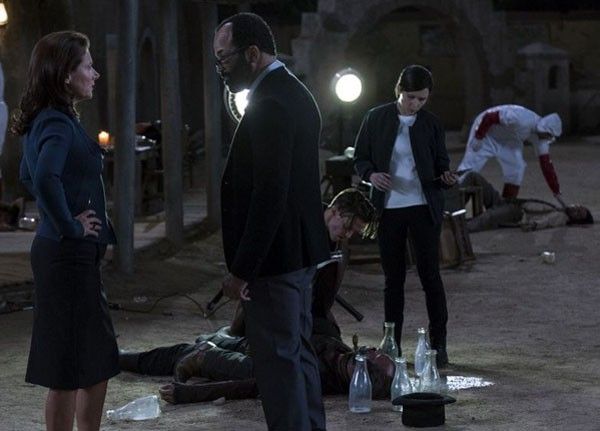 Image via HBO[/caption]
Look at the photo Ford shows Bernard of Arnold, we learned that the man is not Arnold but Ford's father, and there's enough room for another person in the shot -- a person Bernard would not see if it looked just like him because "they cannot see the things that will hurt them". Arnold's life was "marred by tragedy", Bernard is ever-grieving the loss of his son. Then there's the fact, as a commenter pointed out, that Bernard Lowe is an anagram for Arnold Weber. And hey, haven't we seen this basement before? As I said before, this show has not been subtle, the clues have been carefully crafted and well laid out.
Image via HBO[/caption]
Look at the photo Ford shows Bernard of Arnold, we learned that the man is not Arnold but Ford's father, and there's enough room for another person in the shot -- a person Bernard would not see if it looked just like him because "they cannot see the things that will hurt them". Arnold's life was "marred by tragedy", Bernard is ever-grieving the loss of his son. Then there's the fact, as a commenter pointed out, that Bernard Lowe is an anagram for Arnold Weber. And hey, haven't we seen this basement before? As I said before, this show has not been subtle, the clues have been carefully crafted and well laid out.

